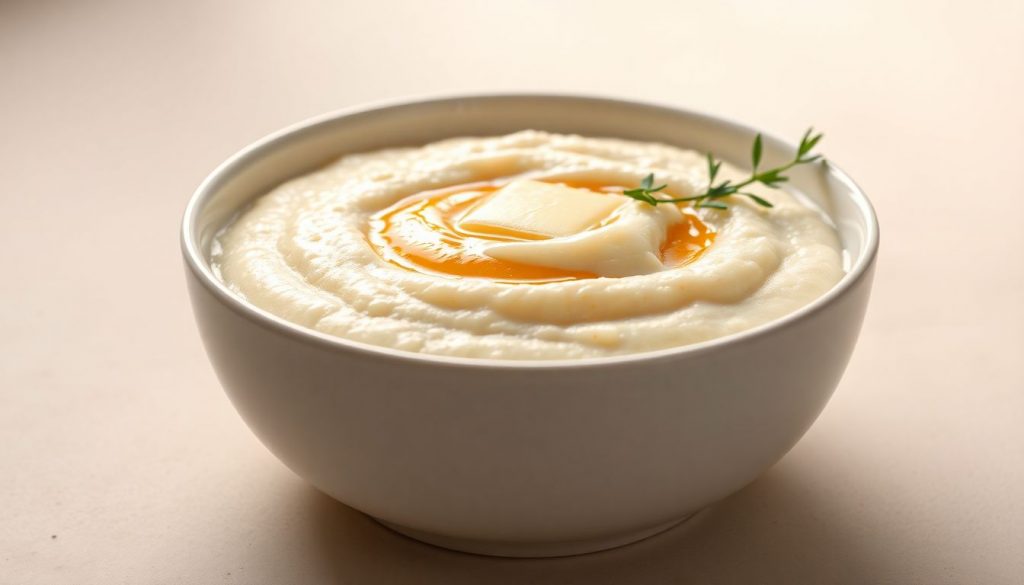What Exactly Are Grits?
A coarsely ground corn dish is what grits are. Grits are not fine ash and coarsely ground version of cornmeal, made from hominy, those kernels of corn dried and treated with alkali to remove hull and germ.
Types of Grits
There are a few forms of grits: stone-ground grits, which retain a greater portion of the corn kernel and coarser texture, as well as a more prominent corn flavor. It would take longer than the average amount of time to cook. Hominy grits are derived from hominy, and they are usually available. Quick grits are pre-cooked and finely ground, taking only a few minutes to prepare.
Origin and History
Grits got history. By the time Europeans showed up, Native Americans were mostly grinding corn for something like porridge long before. That’s kind of how grits turned into what they are today—a basic Southern favorite. The whole concept that a few handfuls of things could come to represent such culture seems simple.
Nutritional Profile of Grits: What’s Inside?
Grits can provide some nutrition but will differ within the types. A cup of cooked regular grits has 182 calories, around 38 grams of carbs, 1-gram fat, and 4 grams of protein. The fiber content is around 2 grams.
Other Vitamins and Minerals
Grits are not sure to be so loaded with lots of vitamins. They give some iron and folate as well. Iron is the energy superhighway. Folate maintains the continued growth of cells. Some enriched grits have added nutrients as well.
Content of Carbohydrates and Glycemic Index
Mainly, grains are carbohydrate. This is a kind of thing that can affect blood sugar because the glycemic index (GI) shows how quickly blood sugar rises after the food has been eaten by someone. Grits are in the category that has a moderate to high glycemic index, which means that these easily cause spikes in blood sugar. But how they are cooked, together with what else is consumed with them, makes all the difference.
Grit Benefits for Health
It’s up to the type of grits and how you prepare them that determines whether grits have health benefits. The whole grain ones have a greater benefit than the refined counterparts.
Fiber for Digestive Health
More fiber is found in stone-ground grits. Digestion is aided by fiber. It helps someone remain on some schedule and be healthy. Fiber promotes fullness as well.
Iron as Energy Carriers and Transports Oxygen
Iron is very important in the carrying of oxygen in blood. Grits contribute to your daily intake of iron, which helps sustain energy levels.
Potential for Gluten-Free Diet
Naturally, grits would be gluten-free. These can be a safe option if you cannot consume gluten. Always check the label to confirm that they were processed in a gluten-free facility.
Possible Drawbacks and Factors to Think About
While grits can be enjoyed on occasion in a healthy manner, several things must be taken into consideration. Certain varieties of grits and methods of preparation leave much to be desired.
Effects on Phytic Acid and Nutrient Absorption
Grits are said to contain phytic acid. Phytic acid binds to minerals, thereby interfering with their absorption. Soaking grits followed by cooking them would be effective, and fermentation would be even better.
Sodium Content and Methods of Preparation
Ready-made grits have a high level of sodium. Too much sodium is harmful. Increases blood pressure. Prepare your grits so you can keep track of the amount of salt.
Could Refined Grits Be a Health Risk?
Too much eating of refined grits may be harmful. They are low in fiber and can spike blood sugar levels. Whole-grain types are better in a balanced sense.
Healthy Cooking of Grits
Cooking grits in a healthy manner is an easy chore. Small substitutions could make major differences. You will be enjoying the flavor while benefiting your health.
Great Toppings for Health
Skip butter and cheese. Incline instead towards veggies, lean proteins, or a drizzle of olive oil. Consider sautéed mushrooms, black beans, or a poached egg.
Whole Grain Or Refined Grits
Whenever feasible, go for whole-grain or stone-ground grits. They harbor more nutrients and fiber than refined grits. Pay close attention to the labels.
Conclusion
So now the question arises- Are grits healthy? The answer is of course a little more complicated. There are some nutritional benefits associated with grits, such as fiber and iron. The other concern is with their carbohydrate content and the risk that they may contain excess sodium. Opting for whole-grain grits and preparing them in an unhealthful way tilts the balance in favor of their health benefits. So, yes, grits find mention in a healthy diet.

